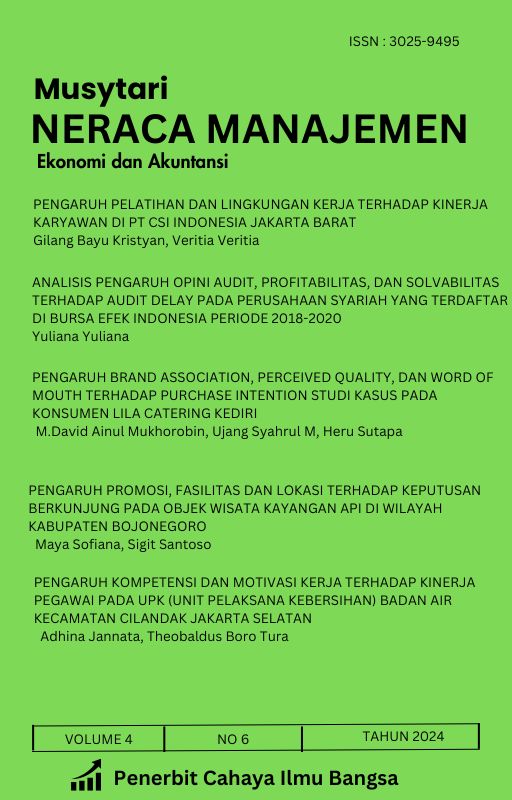Published 2025-06-18
Keywords
- Data integration,
- tax management,
- presentation,
- efficiency,
- digitalization
How to Cite
Abstract
In the era of economic and digital globalization, financial data integration is the main key to effective and efficient tax management in companies. The lack of integration between internal financial systems and tax reporting causes data inconsistency, increased risk of reporting errors, and low tax compliance. This study examines in depth the importance of data consolidation in supporting modern tax management, by adopting descriptive qualitative methods through literature studies and case analysis. The results show that companies that implement financial data integration have higher levels of efficiency in tax reporting, better transparency, and significant reductions in compliance costs. These findings also highlight the role of information technology in supporting a more accountable and data-driven tax administration system. This study recommends technology implementation strategies such as ETL, XBRL, and data warehousing to strengthen the tax reporting system, as well as the importance of collaboration between companies and tax authorities to form a transparent and trusted data ecosystem.
References
- Bryman, A. (2016). Social research methods (5th ed.). Oxford University Press.
- Creswell, J. W., & Poth, C. N. (2018). Qualitative inquiry and research design: Choosing among five approaches (4th ed.). SAGE Publications.
- Dardak, E. E. (2019). Mengawal reformasi birokrasi dengan teknologi informasi. Kementerian Pendayagunaan Aparatur Negara dan Reformasi Birokrasi Republik Indonesia. https://www.menpan.go.id
- Direktorat Jenderal Pajak. (2021a). Laporan tahunan Direktorat Jenderal Pajak 2021. Kementerian Keuangan Republik Indonesia. https://www.pajak.go.id/id/laporan-tahunan
- Direktorat Jenderal Pajak. (2021b). Integrasi data perpajakan Ditjen Pajak dan Pertamina rintis era baru kepatuhan berbasis kerja sama. https://pajak.go.id/id/siaran-pers/integrasi-data-perpajakan-ditjen-pajak-dan-pertamina-rintis-era-baru-kepatuhan-berbasis
- Direktorat Jenderal Pajak. (2024). Integrasi data perpajakan Ditjen Pajak dan Pertamina rintis era baru kepatuhan berbasis kerja sama. https://pajak.go.id/en/siaran-pers/integrasi-data-perpajakan-ditjen-pajak-dan-pertamina-rintis-era-baru-kepatuhan-berbasis
- Edwards, H. R., & Hoefer, R. (2010). Are social work advocacy groups using web 2.0 effectively? Journal of Policy Practice, 9(3–4), 220–229. https://doi.org/10.1080/15588742.2010.489037
- Franz, K., & Swanson, R. (2019). Jaguar expansion: An experimental case study with recommendations. Big Cats Review, 157(3), 59–82. https://doi.org/908834302
- Gast, L. E. (2012). Mastering approaches to diversity in social work. Jessica Kingsley Publishers.
- Gandhi, D., & Velayutham, E. (2020). Tax compliance and digital transformation: The role of big data in tax administration. International Journal of Economics and Financial Issues, 10(6), 22–29. https://doi.org/10.32479/ijefi.10600
- KPMG. (2019). Co-operative tax compliance: Building transparency and trust. https://home.kpmg/xx/en/home/insights/2019/05/co-operative-tax-compliance.html
- Laudon, K. C., & Laudon, J. P. (2020). Management information systems: Managing the digital firm (16th ed.). Pearson.
- McKinsey & Company. (2018). Unlocking the potential of digital tax administration. https://www.mckinsey.com
- Mofin. (n.d.). Finance data integration dan consolidation. https://mofin.id/finance-data-integration-dan-consolidation/
- OECD. (2013). Co-operative compliance: A framework. OECD Publishing. https://doi.org/10.1787/9789264200852-en
- OECD. (2021). Tax administration 2021: Comparative information on OECD and other advanced and emerging economies. OECD Publishing. https://doi.org/10.1787/2fea3832-en
- Pajak.go.id. (2020). Integrasi data perpajakan, Ditjen Pajak dan Pertamina rintis era baru kepatuhan berbasis kerja sama. https://pajak.go.id/id/siaran-pers/integrasi-data-perpajakan-ditjen-pajak-dan-pertamina-rintis-era-baru-kepatuhan-berbasis
- PwC Indonesia. (2021). Tax technology and transformation in Indonesia: Trends and best practices. https://www.pwc.com/id/en/publications/tax/tax-technology-and-transformation.html
- Rahman, A., & Susanti, L. (2020). Pengaruh integrasi sistem informasi keuangan terhadap kepatuhan pajak perusahaan di Indonesia. Jurnal Akuntansi Multiparadigma, 11(1), 45–59. https://doi.org/10.18202/jamp.v11i1.4567
- Romney, M. B., & Steinbart, P. J. (2018). Accounting information systems (14th ed.). Pearson.
- Saputra, H. R., & Yuliana, D. (2021). Analisis perbandingan efektivitas manajemen pajak pada perusahaan dengan sistem keuangan terintegrasi dan non-terintegrasi. Jurnal Pajak dan Keuangan Negara, 5(2), 115–129. https://doi.org/10.31289/jpkn.v5i2.5463
- Scholes, M. S., Wolfson, M. A., Erickson, M., Hanlon, M., Maydew, E. L., & Shevlin, T. (2015). Taxes and business strategy: A planning approach (5th ed.). Pearson.
- Sekaran, U., & Bougie, R. (2019). Research methods for business: A skill-building approach (8th ed.). Wiley.
- World Bank. (2019a). Improving tax administration through digital transformation. World Bank Group. https://www.worldbank.org
- World Bank. (2019b). Indonesia: Tax reform and the new core tax administration system (CTAS). https://documents.worldbank.org
- Yin, R. K. (2018). Case study research and applications: Design and methods (6th ed.). SAGE Publications.
- Zain, M. (2020). Manajemen perpajakan (4th ed.). Salemba Empat.

